Whether you already feel confident about teaching fronted adverbials in Year 4 or find them somewhat perplexing, there's always something new to learn. Here are some of the things experienced teacher Sue Drury has found useful to bear in mind...
What is a fronted adverbial?
Don’t be put off by the rather monstrous name; fronted adverbials are nothing scary. In fact, they are part of an easily recognisable family: the adverbs.
Of course, you're well aware that adverbs are words that describe actions. They show how, when or where a verb is doing its thing (slowly, cheerfully, quietly, etc).
Hopefully, you also know that not all adverbs end with the suffix -ly (straight, hard, yesterday, etc).
An adverbial phrase is simply a group of words that does the same job as a single adverb (the other day, across town, as quiet as a mouse, etc). Adverbial is just the family name for words or phrases that do the same job as an adverb.
Improve your subject knowledge by watching this excellent video from primary English consultant Rachel Clarke, which recaps adverbs, adverbial phrases and the effect of moving an adverbial to the front of a sentence. It's taken from our Teaching Tricky Grammar CPD unit.
So, then, how can you explain fronted adverbials to Year 4? As you now know, a fronted adverbial is merely an adverbial (either a word or an adverbial phrase) stuck at the front of a sentence. Possibly one of the most familiar phrases in storytelling is a fronted adverbial: Once upon a time...
Fronted adverbial examples to show Year 4
- Meanwhile, we went to the park.
- Somewhere near here, Rhea had lost her glasses.
- Just then, there was a knock at the door.
- Somewhat understandably, Mr Turner was not impressed.
- In July, we’re going camping.
- Occasionally, I like to indulge in my favourite ice cream.
Make sure pupils can demonstrate deeper understanding by giving a decent definition, in their own words, of the term fronted adverbials. KS2 students should be able to do this reasonably confidently.
After you've shared the above examples, find a suitable extract of text (or generate one yourself if you’re feeling creative) and get pupils to underline all the fronted adverbials they can find.
Try to ensure that there is a range of fronted adverbial examples, including single words that don’t end in the suffix -ly, to confirm that your pupils have a secure understanding.
If you’re feeling keen, you might also want to discuss whether the author has put a comma after the fronted adverbial. Technically speaking they should, but this doesn’t always happen. This could make an interesting class discussion.
This resource from our Real Grammar collection uses the model text ‘Catching a Train’ to clearly demonstrate fronted adverbials, allowing pupils to see examples in context, practise creating their own and apply them in writing tasks with appropriate support and challenge.
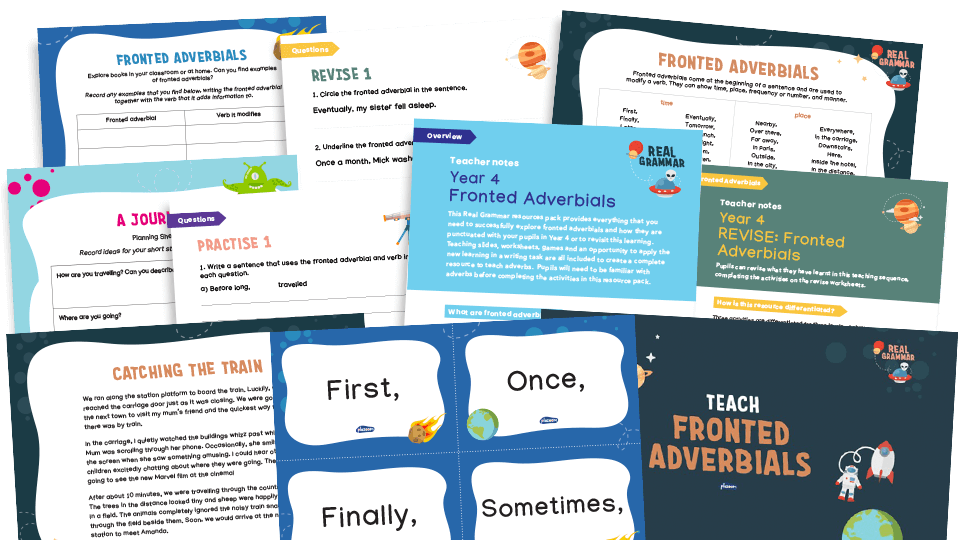
Types of fronted adverbials
As mentioned above, adverbials describe how, when or where the verb is being done. Give pupils a selection of adverbials to sort into those three categories.
To make life easier for yourself, use the version of this activity included in our Year 4 Sentence Starters Grammar Game resource.
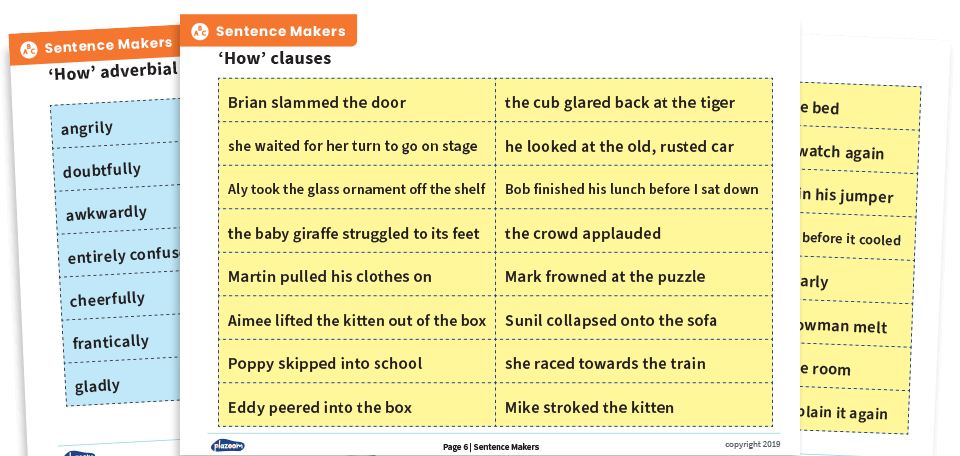
Year 4 fronted adverbial activities
Another fun activity is to provide a range of fronted adverbials and ask pupils to complete a sentence that starts with each of them. No one says they have to be sensible. They should, however, be grammatically correct.
Of course, you could come up with some starters yourself, but it might save you some work to use our fronted adverbial teaching pack and worksheets.
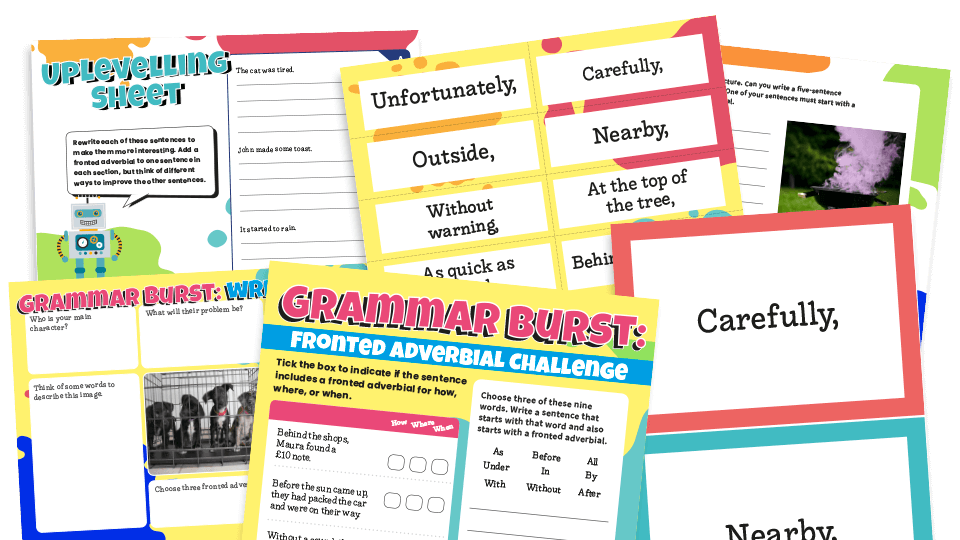
Our fronted adverbials SpaG Challenge Mat also offers a range of activities that really embed understanding.
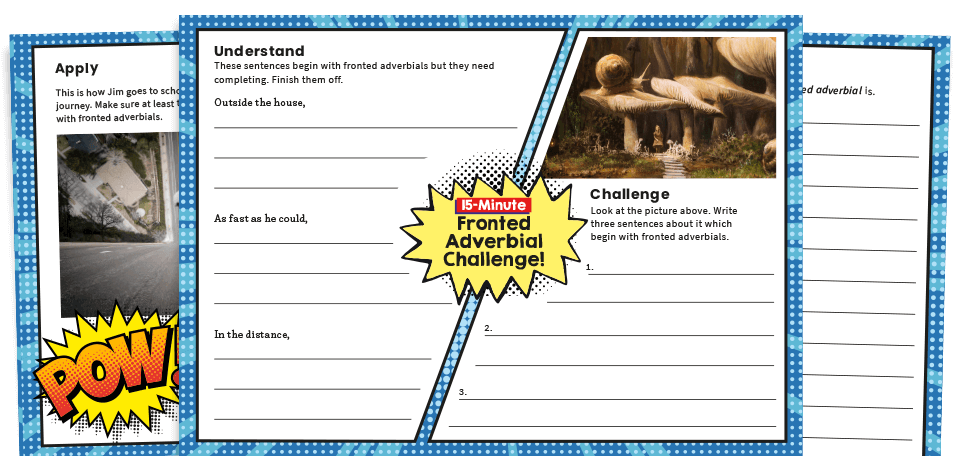
Meanwhile, this Year 4 sentence builder game sees pupils using noun, verb and fronted adverbial cards to create, rehearse and write sentences.
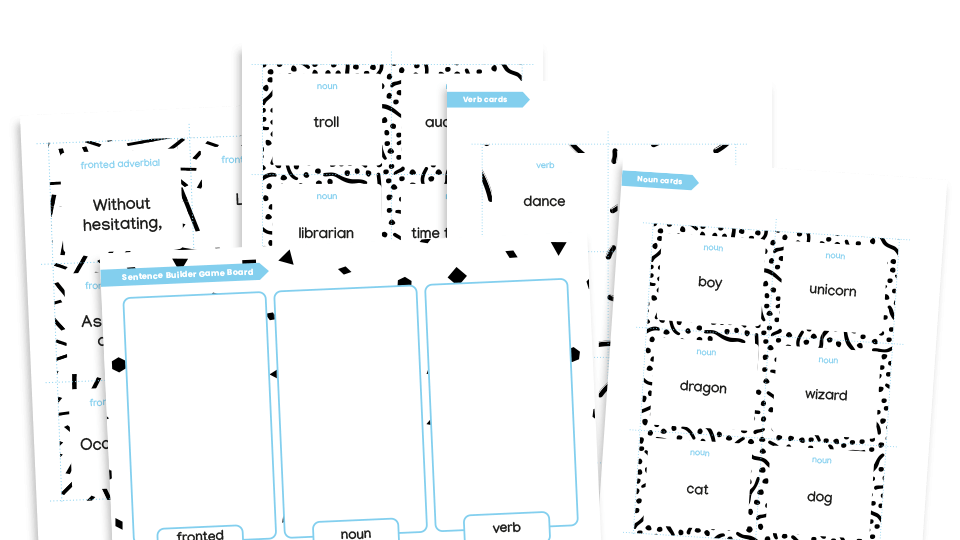
Writing tasks
Of course, the whole point is that pupils are able to apply this knowledge to their own writing. In order to develop good habits, why not set them writing tasks that specifically require them to include fronted adverbials?
This might be in response to an image, for example, that both sparks their imaginations and focuses their minds on writing a certain number of sentences that begin with appropriate adverbials.
Our Real Grammar fronted adverbials resource challenges Year 4 pupils to write a short narrative about a journey featuring fronted adverbials.
Don’t overuse them
Before your Year 4 pupils enthusiastically add fronted adverbials to their writing toolboxes, remind them that almost everything is best in moderation.
Sentences need to be of different styles, lengths and functions to retain the reader’s interest. A whole text in which every sentence is structured the same way will be very dull indeed, no matter how descriptive the adverbials are.
To emphasise this point, set an exercise in which pupils are required to experiment with where they place their adverbials. They should find that putting them at front works well in some cases but ‘feels’ wrong in others.
Successful fronted adverbial use
The ultimate proof that your pupils understand fronted adverbials will be whether they can confidently include them in a larger piece of writing.
Even if you haven’t made them the focus of a particular writing task, why not include them on a peer-assessment checklist now and again, just to see whether they can both use them in their own work and spot them in other people’s?
See? That wasn’t so scary after all, was it?
Sue Drury qualified as a primary teacher in 1999. Teaching pupils from Year 1 to Year 8, she has held a variety of positions including maths and English subject leader, year leader, and assistant headteacher. Sue has mentored students and NQTs, offering guidance and advice using her years of experience. She created many of Plazoom's literacy resources.